Research
Funded Projects (2011-2016)

Evaluation of the impact of extraction of hemicelluloses prior to combustion:
This project is funded by North Carolina BioFuels Center.
Total Investment: $198,178
Economic Analysis of Pine Biomass Feedstocks for Ethanol Production:(2009-2011):
The goal of this project is to measure the cost-effectiveness of using different varieties of pine biomass as a feedstock for ethanol production through enzymatic hydrolysis and fermentation, and to develop an economic model to compare pine with poplar as a biomass feedstock on the basis of availability, cost, and conversion efficiency. This project is funded by the Biofuels Center of North Carolina.
Total Investment: $198,178
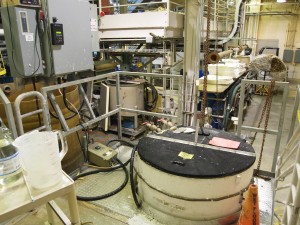
Validation of the RTI Therminator Syngas Cleanup Technology in an Integrated Biomass Gasification/Fuel Synthesis Process (2009-2011):
This project focuses on the validation of the syngas cleanup and syngas conversion unit operations in an integrated biomass gasification/fuel synthesis process. This project is funded by Department of Energy. ($285,181) 2009-2011
Total Investment: $285,181
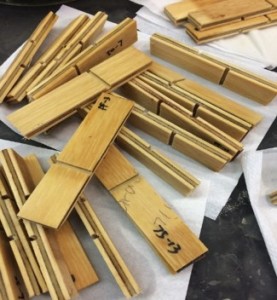
Extraction of Hemicelluloses Prior to Combustion (2010-2012):
Evaluation of the impact of extraction of hemicelluloses prior to combustion. This project is funded by North Carolina BioFuels Center.
Total Investment: $198,178
Advanced Pretreatment and Processing Technologies for the Low Cost Conversion of Industrial Sludges to Ethanol (2010-2012):
The objectives of this project are to understand the effects of several sludge pre-treatments and to demonstrate on a pilot scale the ability to economically process several promising sludges to ethanol. This project is funded by the Biofuels Center of North Carolina.
Total Investment: $183,802
Integrated, Low-cost Torrefaction-Gasification for Production of Biofuels from Forest Resources (2010-2012):
Project goal is to demonstrate that the combination of torrefaction and gasification can provide for a low cost, sustainable and scalable process for the production of liquid transportation fuels using biomass. This project is funded by the Biofuels Center of North Carolina. ($199,128) 2010-2012
Total Investment: $199,128
Integrated, Low-cost Torrefaction-Gasification for Production of Biofuels from Forest Resources (2010-2012):
Project goal is to demonstrate that the combination of torrefaction and gasification can provide for a low cost, sustainable and scalable process for the production of liquid transportation fuels using biomass. This project is funded by the Biofuels Center of North Carolina.
Total Investment: $199,128
Advanced Technology for Low Cost Ethanol from Engineered Cellulosic Biomass (2010-2013):
The goal of this proposal is to demonstrate the technical and economic feasibility of a novel integrated forest-process technology approach to low cost manufacturing of cellulosic ethanol. This project will include the first-ever public demonstration of costs and benefits of developing genetically modified woody biomass, specifically designed for application as bioenergy feedstock. This project is funded by USDA/DOE.
Total Investment: $999,889
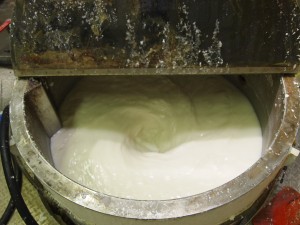
Economics and Feasibility of Biomass Conversion of NC Biomass (2011-2013):
The objective of this research is to study different physical and chemical pretreatment technologies on the enzymatic hydrolysis efficiency of genetically modified hardwoods and to identify the most economical pretreatment. This project is funded by Sungrant/Department of Transportation
Total Investment: $165,000
Technical and Economic Impact of Multiple Biomass Feeds on Ethanol Production at a Repurposed Kraft Pulp (2011-2013):
This project advances the development of a low capital and high efficiency process for the ethanol production from both woody and non-woody biomass in a repurposed kraft mill that has a very high internal rate of return. This proposal is funded by Sungrant.
Total Investment: $249,766
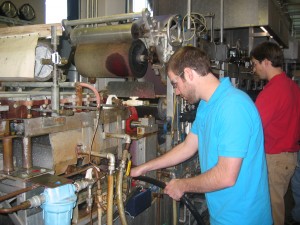
Wood to Ethanol Research Consortium (2011-2014):
Projects funded by a group of industrial partners aimed at simplifying pretreatments and improving the efficiency of enzymatic hydrolysis for implementation in a repurposed kraft paper mill. Consortium members include Arborgen, Shell, Andritz, APTI, API, Catchlight, International Paper, Nalco, KBR, AMEC, Nippon Paper, Novozyme, Genencor, Air Liquide, Bioenercel, Eastman Chemicals, VTT.
Total Investment: $950,000
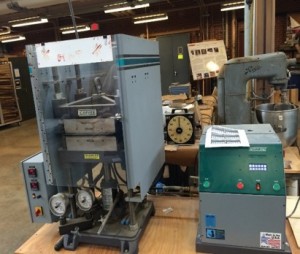
Characterization of Lignin in Non-woody Biomass to Improve Enzymatic Hydrolysis (2012-2013):
The objective of this research is to isolate and characterize lignin and lignin-carbohydrate complex (LCC) from the native and/or the pretreated corn stover and determining the effects of pretreatments on the structure of lignin and the lignin-carbohydrate complex. This project is funded by Novozymes and North Carolina Biotechnology Center.
Total Investment: $145,000
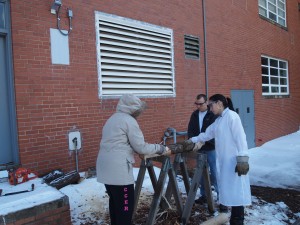
Demonstration Biorefinery at Plymouth Mill for Rural Revitalization: (2012-2014):
In this project NCSU will investigate multiple biomass feedstock streams from woody feedstock and its derivatives, and investigate other uses of lignin and sugars; perform life cycle, environmental, and economic analyses of the various feedstocks. This project is funded by US Department of Agriculture.
Total Investment: $962,000
Life Cycle Analysis of Biochemical and Thermochemical processing Technologies to Produce Biofuels from Forest Resources (2012-2014):
The project goal is to determine the environmental impacts in a quantitative manner via standard life cycle analysis methods of different biofuel production technologies. While the economic and political benefits of forest based energy are important, the overall environmental impact of such technologies relative to other energy sources, renewable and non-renewable, will remain as the most important long term concern for mankind. This project is funded by CORRIM and North Carolina Biofuels.
Total Investment: $90,000
Building a Biofuels Industry: A Southeastern Partnership for Integrated Biomass Supply Systems (2012-2016):
The objective of this research is to define relationships between feedstock production and their performance in different processing technologies for their conversion into biofuels and other valuable co-products. This research task will examine the technical feasibility of liquid fuels and co-products production using biochemical conversion of herbaceous and woody biomass feedstocks that can be grown in the Southeastern US. This project is funded by Agricultural and Food Research Initiative.
Total Investment: $560,000
Biomass to Biochemicals and Biomaterials Consortium: (2014-2016):
This project aims to show the feasibility of producing high purity sugars and then converting them to biochemical. In addition it also evaluates options for upgrading the lignin residues from a biorefinery. The project is supported by a consortium of companies.
Total Investment: $400,000
Bamboo to Tissue Consortium (2014-2016):
Study of the economics of bamboo growth and market pulp production, as well as characterization of key fiber and paper properties for tissue manufacture. This project is supported by a consortium of companies.
Total Investment: $75,000
Optimization of Higher Temperature Dilute Alkali Treatment Followed by Mechanical Refining to Produce Low-Cost Sugars and Lignin (2014-2016):
Develop a process that consist of a mild alkaline pretreatment in combination with refining to decrease the capital cost for a bioethanol plant in comparison to a dilute acid process. The project is funded by Alliance for Sustainable Energy.
Total Investment: $100,000
Evaluation of Paper Strength Additives Based on Natural Polymers (2014-2016):
Develop additives for the papermaking process based on natural polymer such as soy protein, starch, hemicellulose and chitin to improve the end use properties such as strength and water absorption characteristics. The project is funded by Georgia Pacific.
Total Investment: $50,000
Tobacco Deconstruction Utilization Consortium (2015-2016):
Develop process for the conversion of tobacco stalk (waste agricultural product left in the field and burned currently) available at a low cost to a dissolving pulp. Develop and evaluate simple processes that can efficiently extract the a-Cellulose component of the stalk and convert the material to an acetate grade of dissolving pulp. This consortium is funded by RJR and Isorca.
Total Investment: $150,000
Mechanical Refining Technology to Produce Low Cost Sugars From Biomass (2015-2017):
This research will provide scientific and technical insights on the novel use of mechanical refining to overcome biomass recalcitrance and lower sugar production costs from various biomass sources. This project is funded by Sungrant – Department of Transportation.
Total Investment: $150,000
Improving the Economics of Bio-based Processes by Upgrading the Value of the Residual Lignin (2015-2017):
We propose the utilization of lignin residue in the area of adhesive application. The best application will depend on the type of biomass, pretreatment chemistry, and lignin depolymerization method. We will evaluate two options proposed in this project based on laboratory research, process simulation and detailed financial analysis. This project isNorth Carolina Biotechnology Center.
Total Investment: $120,000
Graduate Students

“Use of Lignin in Adhesives”, Jing Du (Ph.D. Current)
“Modification of Enzymatic Hydrolysis Residue for use in Adhesives”, Xiao Jiang (Ph.D. Current)
“Impact of Biomass Characteristics on Autohydrolysis”, Robert Narron (Ph.D. Current)
“Techno Economic Analysis of Biorefienries for the production of Biochemicals”, Grant Cullbertson (Ph.D. Current)
“Development of a Novel Process for a Biorefinery with Softwood using a Sulfite Pretreatment”, Ben Jeuck (Ph.D. Current)
“Interaction of Surfactants with Lignin to Improve Enzymatic Hydrolysis”, Consuela Fritz (Ph.D. Current)
“Impact of Harwood Lignin Structure on Oxygen Bleaching”, Valeria Juste Gomes (Ph.D. Current)